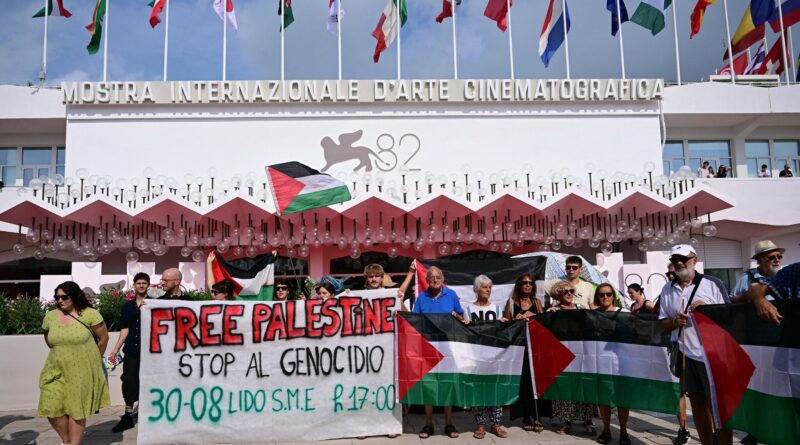Pro-Palestine Protesters Demand Global Attention at Venice Film Festival
Advocates for Palestine are orchestrating various demonstrations during the Venice Film Festival, taking place between the 27th of August and the 6th of September. The aim is to urge the festival to publicly condemn the perceived genocide in Palestine, attributed to Israel. On the morning of August 27, more than ten protesters congregated at the red carpet right before the kick-off of the festival. They voiced their demands, chanting ‘Free, free Palestine’ and ‘Stop, stop genocide’, all while holding aloft Palestinian flags.
This demonstration is a prelude to a larger march scheduled to occur on the 30th of August, on the Santa Maria Elisabetta avenue. A representative of the planned event has indicated that it would involve ‘hundreds of people’ and aims to influence the festival’s attention towards the pressing issue. The objective of this march is to utilize the film festival’s global reach to amplify the narrative surrounding the Palestine issue.
According to the spokesperson, the march has received broad support, including ‘hundreds of signatures’ from political factions, organizations, and groups located not just in the Veneto region – where Venice is – but far beyond. These entities collectively call upon the festival to adopt a public position on the matter. This demand for a clear stance is driven by the belief that the festival, with global attention fixed on it, has an obligation to amplify stories of global injustice.
‘During a time where the global spotlight is on Venice and the Film Festival, we should utilize this unique platform to broadcast the outcry and dissent echoing from various quarters. Let us pivot the festival’s spotlight towards Palestine,’ stated the Italian political organizations participating in the march. This point was made during an official statement dated August 25, announcing their protest.
The statement goes on to express their contentions around the denial of humanitarian aid, food, and water. It refers to these actions as part of a genocide strategy, supported by the U.S. and European governments, including Italy’s own. Italy is accused of continued political, diplomatic, and economic support for Israel, alongside providing weaponry and preserving trade agreements.
The statement didn’t just stop at accusations, it demanded action too. Its demands specifically target well-known figures, Israeli actress Gal Gadot and IDF supporter, actor Gerard Butler. The protestors have called for both these celebrities to be disinvited from the festival, pointing out their affiliation with Israel.
In addition to this march, an open letter has previously been signed by hundreds of individuals from the film community. The letter, separate from the march, implored the festival to take a ‘clear and unambiguous stand. This letter was publicized on the 23rd of August.
The letter asserts that all those involved in any capacity have a moral obligation to enhance and disseminate the narratives and voices of those suffering unimaginable horrors. This obligation holds true, despite what the letter refers to as ‘the complicit indifference of the West.’ According to the signees, this obligation transcends borders, politics, and ideologies.
Among the signatories were notable figures from the film world, including recipients of the Best Director award in the Cannes Un Certain Regard category for their film ‘Once Upon a Time in Gaza’. Other signatories include a noteworthy director and an Italian actor currently featuring in the Venice opening film, Paolo Sorrentino’s ‘La Grazia’.
The festival officially responded to these prevalent sentiments on August 23. Their response highlighted the screening of ‘The Voice of Hind Rajab’, a movie by a Tunisian director, which narrates the gut-wrenching story of the demise of a 5-year-old Palestinian girl.
The festival concluded its statement affirming that it remains, as it has always been, open to dialogue. This stance suggests a willingness to engage in discussions around the contentious issue and accept differing opinions, despite its neutral positioning. This neutral stance is seen in its decision to showcase a film focusing on the narrative of a Palestinian child, simultaneously signifying its commitment to storytelling, irrespective of geographical or political boundaries.

